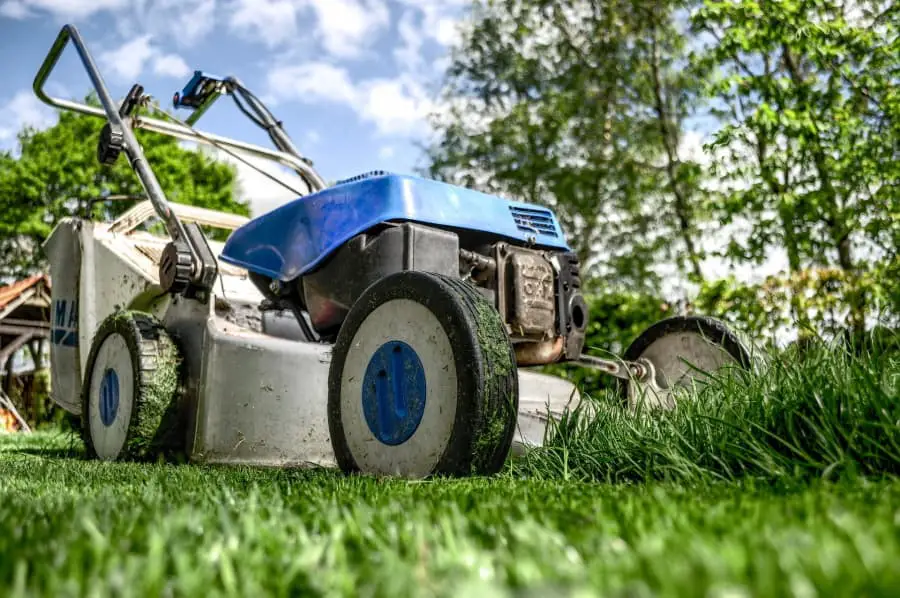To many people, walk-behind mowers are the “true” lawnmower. While we are huge fans of garden tractors and zero-turns, there is no denying that the walk-behind’s form factor is still the classic representation of lawn maintenance. However, that does not mean that walk-behinds haven’t evolved over the years.
Self propelled lawn mowers are definitely worth it. It is important to get a quality mower built with reliable parts and construction. Though self propelled mowers make lawn maintenance much faster and easier, pushing a self propelled mower with a faulty drive system is exponentially harder.
One of those evolutions is self-propulsion technology, which is our primary focus today. Join in as we discuss the basic workings of self-propelled mowers, and the reasons they came to be in the first place. We then go over their benefits and drawbacks before we help you determine if these mowers are worth the (often considerable) investment.

Contents
What Is A Self Propelled Lawn Mower?
When it comes to powered walk-behind lawnmowers, you have two main types.
A Self Propelled Lawn Mower in contrast to a push mower is one that has a transmission and drive system that gives power to the wheels to move the mower forward. This is in addition to the engine turning the blades for cutting action. They are also on average heavier due to the extra parts.
The Operator Propelled Push Mower
The first is the push mower. Push mowers have combustion or electric motors that drive rotary blades. However, as the name suggests, the operator must push the mower in order to cover the ground. This type of mower is still fairly popular and is often one of the entry-level mowers offered by some brands.
The Power Walk Behind Self Propelled Lawn Mower
The second power walk-behind is the self-propelled lawnmower. Like the push mower, self-propelled mowers have rotary blades that are driven by combustion or electric motors. However, unlike with push mowers, the engines on self-propelling mowers also drive the movement of the wheels. This means operators only have to focus on directing the mower.
How Does A Mower’s Self Propulsion Work?
Self-propulsion technology was developed to save operators from pushing lawnmowers for extended periods, which can be very strenuous. Lawnmowers that can power their own movement also counteract problems such as a big yard, uneven terrain, or even the disability of the operator. In a nutshell, it makes mowing easier!
A self-propelled mower works by way of a drive system that links the mower’s drive shaft to its wheels and mower blades. The operator controls this link with a special squeeze-handlebar known as a “bail”. While the mower engine is running, the operator squeezes and holds the bail to engage the self-propulsion system and mower blades.
When the bail is released, the mower’s propulsion and blades are immediately disengaged. This is a safety measure to prevent the mower from wheeling off by itself with the blades in motion.
Single Vs Variable Speed Self Propelled Mowers
There are two kinds of self-propulsion systems: single speed and variable speed.
Single-speed mowers cannot be regulated, so they go as fast as they were designed to every time the bail is engaged. Variable speed mowers have a regulator shifter or dial that allows the operator to control the speed of the mower’s movement.
Self-propelled mowers, like motor vehicles, are also classified by the wheel drive system they use. You have two-wheel drive systems and all-wheel-drive (AWD) systems. Two-wheel drive mowers are either front or rear-wheeled.
AWD systems are used on heavy-duty mowers so they can tackle tricky terrains and steep gradients.
Want to know more about mowers? I recommend some of my other articles…
- Honda Vs Briggs & Stratton Engine For Lawn Mowers
- How Long To Mow An Acre And What Mower Size Is Best?
- How Does A Lawn Mower PTO Work?
Pros And Cons Of Self Propelled Lawn Mowers
Now that we’ve familiarized ourselves with the basics of self-propelled mowers, it’s time to look at their benefits and drawbacks.
The Upside To Self Propelled Lawn Mowers
If self propelled mowers are so good, what are some of the benefits?
Pro 1 To Self Propelled Lawn Mowers
Without a doubt, the main advantage of self-propelled lawnmowers is the sheer convenience. Gone are the days when cutting your grass was a laborious chore that required you to (almost literally) wrestle with the mower. A self-propelled mower does most of the heavy lifting for you.
Pro 2 To Self Propelled Lawn Mowers
Another advantage is safety. A self-propelled mower’s drive system disengages the propulsion and the blades. In the event of a slip, the mower won’t speed off with its blades spinning. This feature is also beneficial if you need to momentarily stop mowing to clear obstacles or empty the mulching bag.
Pro 3 To Self Propelled Lawn Mowers
Thirdly, because human power isn’t much of a factor, self-propelled mowers will ultimately save you time. Unlike people, machines don’t get tired. The mower will be able to maintain the same pace as you mow.
Pro 4 To Self Propelled Lawn Mowers
A self-propelled mower is also beneficial for people with illnesses and disabilities that impact their ability to operate push mowers or even riding mowers. Operators only have to focus on directing the mower, which makes a huge difference.
Pro 5 To Self Propelled Lawn Mowers
Self-propelled mowers with variable speed control allow you to set the pace. This allows you to choose between a quick trim or a long lazy Sunday afternoon mow.
Pro 6 To Self Propelled Lawn Mowers
Self-propelled mowers also form a nice middle ground between strenuous push mowers and pricey lawn tractors. While they are a little more expensive than push mowers, they are far more affordable than most riding mowers.
The Downside To Self Propelled Lawn Mowers
Now on to the negatives…
Con 1 To Self Propelled Mowers
The first disadvantage with self-propelled mowers is their limited range. This is especially true for battery-powered mowers. While they are marketed for large yards, don’t expect them to tackle large-scale projects like golf courses or parks.
Con 2 To Self Propelled Mowers
Secondly, their complicated drive system means that transmission issues are often irreparable. In the event of problems, you will probably have to get a new transmission…which isn’t cheap.
Con 3 To Self Propelled Mowers
This leads us to the next drawback…wet grass. Using a self-propelled lawnmower to cut damp grass is a big problem because the clippings may form clumps that could clog up the machine’s transmission.
The Benefits Versus Drawbacks Of Self Propelled Mowers
| Pros | Cons |
| Convenient and easy to use | Limited range |
| Time-saving | Expensive transmission issues |
| Easier for people with disabilities | Not ideal for cutting wet grass |
| More affordable than riding mowers | |
| Safety features | |
| Adjustable speeds (some models) |
How Long Do Self Propelled Lawn Mowers Last?
The good news is that you, as the owner, have direct control over the longevity of your mower. If you service the machine on time and avoid abusing it, it can easily last longer than a decade. So, what is the average time that a new owner can expect to have a recently purchased power walk behind lawn mower?
Typically, a self-propelled mower can last for about 10 years. The quality of the machine’s manufacturing and parts comes into play along with the owner’s maintenance schedule and the frequency of use. This 10 year self propelled mower life span is for normal use on flat grassy surfaces.
Of course, build quality is a major consideration too. Cheap mowers from shady brands are not likely to last as long as machines from reputable brands.
Will Pushing A Self Propelled Lawn Mower Damage It?
Let’s say you buy one of these innovations in walk behind mowing and something happens to the propulsion system. Since we live in the real world with problems popping up all the time, it can happen. Is it safe or advisable to push a self propelled lawn mower that won’t move on its own?
A Self Propelled Lawn mower can be pushed without damaging the transmission or changing the mowing function. Although, a self propelled mower’s extra weight due to the transmission and drive components can make pushing one taxing or even a health risk for those with health concerns.
This is not only the case if the mower has lost propulsion or isn’t operating at all. This can be an issue with transport and setup.
Anyone who has used any form of push mower knows that some level of manhandling is necessary for moving it around before and after the job is done without the motor running. This becomes a noticeable issue with a self propelled mower carrying a measurable amount of extra weight.
Here is a simple comparison of just one two push mowers from MTD, and their well known basic brand.
| MTD Model | Overall Weight |
| Yard Machines 21-Inch Self-Propelled Gas Lawn Mower (Amazon link) | 80.8 lbs |
| Yard Machines 20-Inch Push Gas Lawn Mower (Amazon link) | 47 lbs |
So, it is not just a concern of whether or not the mower will be damaged due to pushing a self propelled mower, especially the elderly trying to do so could damage themselves.
The average weight of most self propelled mowers is in the 70 to 80 lbs ranges. The average push mower weighs in the neighborhood of 50 lbs.
There is no doubt that many people push these mowers around with no problem for them or their mowers. Yet, it is definitely something to consider.
The Final Touches On Is A Self Propelled Mower Worth It…
So, are self propelled mowers worth it?
Yes!
Self-propelled mowers are absolutely worth it, especially for homeowners. Commercial landscapers may be better off with lawn tractors and zero-turns though.
Self-propelled mowers offer so much convenience as well as safety features that even a child can use one! (Though I would strongly advise parental supervision. Just saying.)
To top it off, since most major brands are migrating to self-propulsion systems, the number of self-propelled mowers on the market is only going to increase. This fierce competition is good news for you the customer, because it will force prices to remain reasonable.
This is not all there is to say about mowers. If you want to read more, here are some of my other articles…
- Honda Vs Briggs & Stratton Engine For Lawn Mowers
- How Long To Mow An Acre And What Mower Size Is Best?
- How Does A Lawn Mower PTO Work?
References
https://lawnsmartusa.com/pros-and-cons-of-self-propelled-lawn-mower/
https://www.thespruce.com/how-do-self-propelled-lawn-mowers-work-2130875

